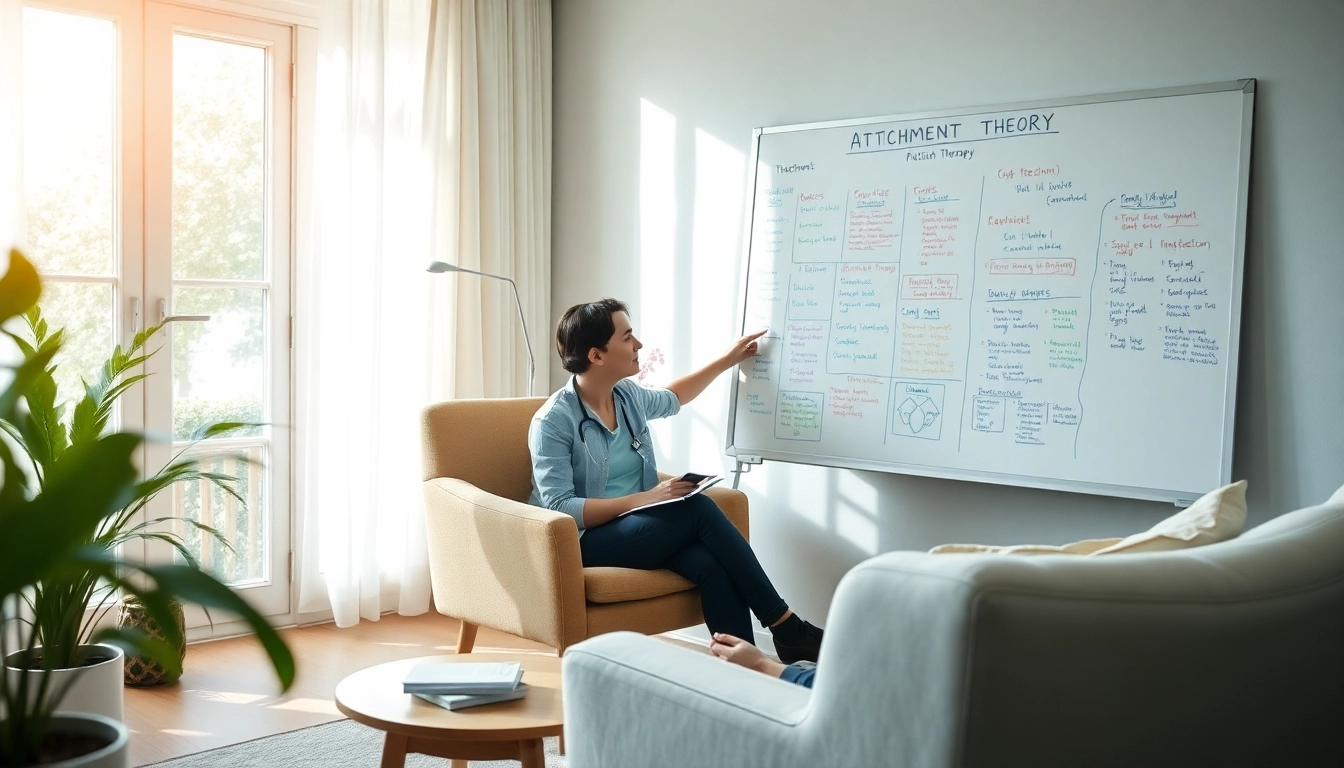What is an Attachment Theory Specialist?
Defining Attachment Theory
Attachment theory is a psychological framework that explores the bonds formed between individuals, particularly in early life and how these bonds affect relationships throughout adulthood. The theory, pioneered by John Bowlby and later expanded by Mary Ainsworth, emphasizes the significance of early relationships, especially with primary caregivers. It posits that the emotional bonds formed during formative years influence an individual’s emotional and relational styles later in life. Understanding these frameworks is essential to addressing core issues in psychology and therapy, making the role of an attachment theory specialist pivotal in modern therapeutic practices.
Qualifications of an Attachment Theory Specialist
An attachment theory specialist typically holds advanced degrees in psychology, social work, or related fields. They are well-versed in the nuances of attachment styles, which include secure, anxious, avoidant, and disorganized attachments. This expertise often extends to various therapeutic modalities such as Emotionally Focused Therapy (EFT), Attachment-Based Therapy (ABT), and trauma-informed care practices. Certification programs and specialized training further enhance the professional’s ability to implement attachment theory in therapeutic settings effectively.
Importance in Psychological Practice
Attachment theory is integral to understanding client relationships and providing effective therapy. By recognizing the impact of early attachment experiences, specialists can tailor interventions that foster healthier patterns of connection and conflict resolution. This is vital in therapeutic settings, as many clients present with relationship issues rooted in their attachment styles. Furthermore, incorporating attachment theory fosters a comprehensive approach that combines individual psychological insights with relational dynamics.
Common Issues Addressed by Attachment Theory Specialists
Understanding Relationship Patterns
Understanding relationship patterns is key for an attachment theory specialist. Individuals often exhibit specific relational behaviors predicated on their attachment styles. For instance, someone with an avoidant attachment style may struggle with intimacy, while those with anxious attachment may experience clinginess or insecurity. By identifying these patterns, the specialist can guide clients toward healthier relational dynamics.
Dealing with Attachment Trauma
Attachment trauma, rooted in adverse childhood experiences or inconsistent caregiving, can have long-lasting effects on an individual’s emotional health. An attachment theory specialist is trained to help clients process their trauma, offering interventions that facilitate healing. This can include narrative therapy approaches that allow clients to reconstruct their personal stories and find empowerment in their experiences.
Enhancing Emotional Connections
Specialists also work on strategies to enhance emotional connections between individuals. By nurturing secure attachment styles, clients can develop healthier emotional responses and connections with others. This is particularly useful in couples therapy scenarios, where improving communication and understanding each partner’s attachment background can heal and strengthen relationships.
How to Choose the Right Attachment Theory Specialist
Assessing Credentials and Experience
When selecting an attachment theory specialist, it’s crucial to assess their credentials and clinical experience. A well-qualified specialist should not only hold the necessary educational background but also have extensive practical experience in applying attachment theory in therapy. Requesting references or seeking reviews from past clients can provide insight into the effectiveness of their approach.
Cultural Competence and Approaches
Cultural competence is vital in therapeutic settings. An effective attachment theory specialist should demonstrate an understanding of how cultural backgrounds influence attachment styles and relationship dynamics. This includes being responsive to diverse family structures, cultural expectations, and values. Awareness of these elements can significantly bolster therapeutic outcomes, fostering a deeper connection between the specialist and the client.
Communication Styles and Compatibility
The therapeutic relationship hinges on a strong rapport and mutual understanding. Prospective clients should consider the communication style of the specialist. Feeling comfortable and understood can greatly impact the therapy’s effectiveness. Initial consultations or assessments can provide valuable insights into compatibility, helping clients choose a specialist who aligns with their needs and preferences.
Methods and Techniques Used by Attachment Theory Specialists
Attachment-Based Therapy Techniques
Attachment-based therapy employs specific techniques to help clients explore their attachment styles and their effects on relationships. Methods may include role-playing, guided imagery, and exercises that focus on improving emotional responsiveness. These techniques aim to foster secure attachments and encourage open communication between partners.
Integrating Other Therapeutic Approaches
Attachment theory specialists often integrate various therapeutic approaches to provide a holistic treatment plan. For example, incorporating Cognitive Behavioral Therapy (CBT) principles can help clients understand and change negative thought patterns that stem from their attachment issues. Similarly, mindfulness practices may be utilized to enhance emotional regulation and self-awareness in clients.
Measuring Progress in Therapy
Measuring progress is essential in therapy, and attachment theory specialists employ several methods to track client advancements. This can involve self-report measures, progress assessments, and feedback sessions. Regularly evaluating goals and outcomes not only helps clients stay motivated but also allows the specialist to adjust therapeutic plans to enhance efficacy.
The Impact of Working with an Attachment Theory Specialist
Improving Personal Relationships
One of the most significant impacts of working with an attachment theory specialist is the improvement in personal relationships. By addressing underlying attachment issues, clients can develop healthier bonds with family, friends, and romantic partners. Enhanced relationship skills lead to a deeper sense of connection and satisfaction.
Building Self-Esteem and Resilience
Therapy focused on attachment theory helps clients build self-esteem and resilience. Through understanding their attachment styles, clients can identify negative patterns and learn strategies for self-love and reinforcement. This newfound self-awareness often translates into greater resilience when facing life challenges.
Long-Term Benefits of Attachment-Focused Therapy
The long-term benefits of working with an attachment theory specialist extend beyond immediate relational improvements. Clients often report sustained emotional growth, increased empathy towards themselves and others, and a profound understanding of their emotional lives. This long-lasting transformation develops a foundation for ongoing personal growth and healthier relationships throughout their lives.



